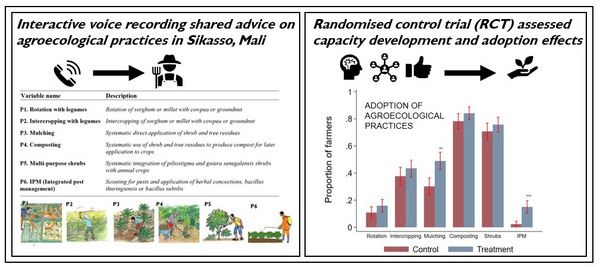Agroecological intensification is a key strategy for the further development of sustainable production systems. The scaling of agroecological approaches and practices requires effective mechanisms for knowledge sharing. Digital extension can complement traditional advisory services; especially in contexts where resources and reach are limited or where security risks may restrict access; as is the case in parts of the Sahel. Interactive voice recordings (IVR) are particularly suitable as they work with standard phones and without the need for an internet connection or literacy.
Objective
The research project aimed to generate robust evidence on the effectiveness of IVR to share knowledge on six relevant agroecological practices (rotation and intercropping with legumes, mulching, composting, shrub integration, and integrated pest management). For this purpose, we evaluated a pilot intervention in the Sikasso region of Mali.
Methods
The evaluation is based on a cluster randomised controlled trial, which is the gold standard for causal attribution in impact studies. Farmers were randomly allocated to two groups, which guaranteed a high degree of similarity in terms of characteristics between participating and non-participating farmers. The study then tested the hypothesis that IVR messages increase capacities and adoption around all six included agroecological farming practices.
Results and conclusions
When aggregating across practices, significant positive effects were observed for all outcome variables (awareness, sharing of practices, interest to learn more, confidence in applying the practice, intention to use, and actual adoption). Intention-to-treat effects ranged from 12% to 97%. Once individual practices were assessed, effects were generally positive, but no longer significant across all outcomes. Regarding the adoption outcome, mulching and integrated pest management exhibited significant increases.
Significance
This impact evaluation of a digital training adds to previous studies, as it is oriented explicitly towards an agroecology-based crop management approach. The evaluation results demonstrate that IVR advice can play a role in scaling and promoting agroecological intensification.
This study was presented at the 2024 International Conference of Agricultural Economics in Delhi, below is the link to the conference paper.
Further information
Weblinks
ageoconsearch.umn.edu: Conference paper

 tap and then scroll down to the Add to Home Screen command.
tap and then scroll down to the Add to Home Screen command.